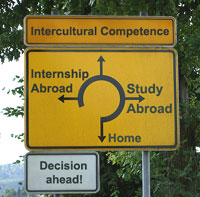
Today I would like to introduce you to the “Go-Out” Campaign of the German Academic Exchange Service and the German Ministry of Education and Research.
Both institutions have formed an alliance to increase the percentage of German students who spend time abroad during their studies. The aims include studying abroad, doing an internship abroad, writing your Bachelor or Master thesis abroad or following language courses abroad. One of the aims is also to encourage students to look beyond Europe and spend some quality time in Asia, Latin America, or Africa in order to round off their studies in Germany. Please visit the web page of the Go-Out campaign at www.go-out.de. Please have a look at the profiles of former outgoing students such as Birgit and Siegfried who studied in Israel and China.
absolutely connected
Today I will invite you to listen to students from the University of Applied Sciences, Koblenz, RheinAhrCampus, who have already been abroad or are planning their stay but also to professionals from the international office who share their experiences with us and can perhaps whet your appetites for such a stay abroad.
How should you prepare for your stay abroad? Why do German employers think that if you have spent some time abroad you will be a better employee? Let us try to find out why your stay abroad will be a unique opportunity. A stay abroad during your studies is certainly a valuable extra for your career planning. Your experience abroad, whether study or internship, will help you develop and round off your personality but will also provide impressions and insights which perhaps others will envy you later. Many job advertisements nowadays list the requirement “experience abroad”, even if the job itself does not seem to require international contact.
absolutely representative
Before and during their stays abroad students are often not really aware of what the real benefits of their experience will be. This will only show years later. And sometimes students unfortunately give up their plans because they cannot imagine where they should get the extra money from, whether they can survive with their basic English, or whether they should really leave their friends and family behind for several months. When you have these doubts, you should not give up but ask for help from your university. In this category I spoke to Andreas Faulstich who is responsible for the language program at RheinAhrCampus of the University of Applied Sciences, Koblenz. I asked him how many of his students do actually go out to study or do an internship abroad. And what keeps those who decide against it from seeking that valuable experience? Is it always the extra costs that students may have to shoulder?
absolutely prepared
So let us turn to our next step, the preparation for a stay abroad. Some time ago I interviewed Carsten just before he went to Great Britain to do his practical training He is from a little village near the university and put a lot of effort into preparing himself for his practical training abroad and, as a consequence, managed to secure a scholarship for himself under a program called ERASMUS Placements. One of Carsten’s aims is to “grow up” through new personal experiences.
absolutely shocked
How can students find out what exactly needs to be prepared before they take their decisions and hand in their applications? At every university in Germany students will find help with these questions in the international office. In our last category I asked Barbara Neukirchen who works for the international office how early she needs to get in contact with students to prepare them strategically for their stay abroad.
The next show will be hosted by Anne Fox in Denmark on 28 May
Until then –
Bleiben Sie absolut interkulturell!
The host of this show is: Dr. Laurent Borgmann
Editor: Dino Nogarole

